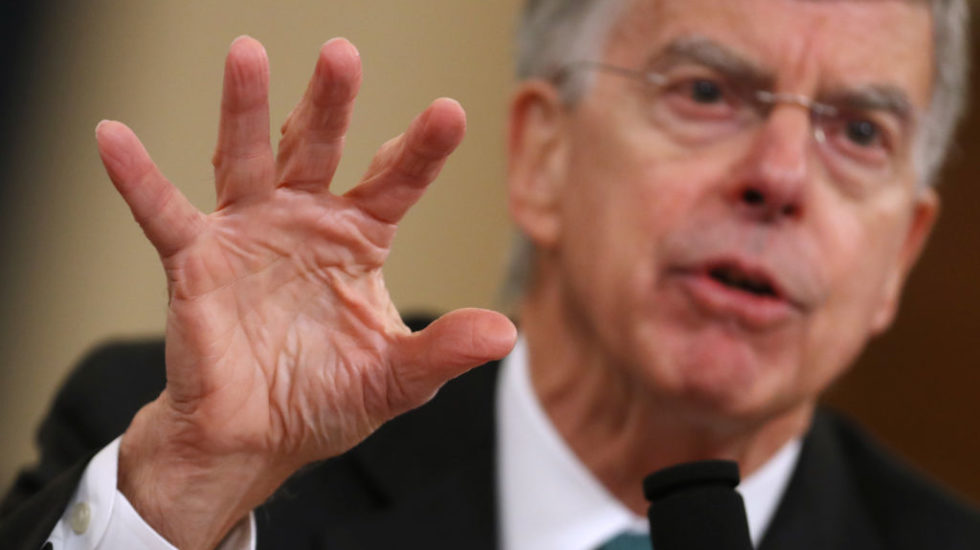It was quite a day on Capitol Hill.
Democrats and Republicans heard testimony from two diplomats at a House impeachment hearing, then spent hours wrangling over deeply complex details of what’s actually a simple accusation against President Trump:
That he used the power of his office to pressure Ukraine’s president to investigate former vice president Joe Biden, Trump’s potential Democratic opponent in the 2020 election.
More on the testimony and the hearing in a moment.
First, though, a couple of thoughts from Dan Rather:
One, it’s important to note that the core question to be answered is not whether Trump solicited foreign interference in a U.S. election in which he’s a candidate. He did.
That’s shown by the evidence and sworn testimony, including Trump’s order to hold up nearly $400 million in military aid desperately needed by Ukraine, aid that was eventually released.
Two, here’s what these hearings are really about: Were Trump’s actions a violation of his oath of office, sufficient to justify impeachment by the House and a Senate trial that could result in removing him from office?
As Rep. Adam Schiff, chairman of the House Intelligence Committee, put it, “The matter is as simple, and as terrible as that.”
Finally, Dan asks: did what Trump try to do amount to extortion? Bribery? Corruption? All three, or none?
And there’s one additional question, of less concern to the inquiry but politically important: Will any House Republicans defect and vote for impeachment?
The answers to those questions can’t come before the inquiry is complete, of course, but all concerned Americans should keep them them in mind as the hearings go on.
Wednesday’s hearing featured the first public testimony of the House impeachment inquiry, from Bill Taylor, acting U.S. ambassador to Ukraine, and George Kent, a ranking State Department official.
In his opening statement, Taylor said he was told that Trump “cared more” about investigating Biden than he did about protecting Ukraine from Russia.
“If we believe in the principle of the sovereignty of nations…we must support Ukraine in its fight against its bully neighbor,” Taylor said. “Russian aggression cannot stand.”
In one new revelation, Taylor said that a member of his staff was in Kiev, dining with Gordon Sondland, U.S. ambassador to the European Union, when Sondland called Trump — and the president spoke loudly enough that the staffer could hear him ask Sondland about the status of “the investigations.” That Taylor aide is expected to testify at the next impeachment hearing, on Friday.
This overheard conversation occurred on July 26, the day after Trump asked Ukraine’s President Zelensky for “a favor” — to publicly announce that his government was investigating Biden and his son, Hunter, who at the time served on the board of a Ukrainian energy company.
In his statement, Taylor said he thought at the time that it was “crazy” and “illogical” for the administration to make military aid contingent on Ukraine announcing investigations into the Bidens.
Taylor also described in detail what he called a “highly irregular” effort, led by Trump lawyer Rudy Giuliani to place the president’s political interests at the center of U.S. policy toward Ukraine. Giuliani is Trump’s private attorney, not a government official.
Kent and Taylor agreed that Giuliani’s purpose was to “dig up political dirt” on Biden.
The Republican counsel, Steve Castor, sought to turn things around, saying that in fact Ukraine was actively supportive of Hillary Clinton in 2016, largely because Ukraine’s government thought Clinton would win.
Castor pressed Taylor on whether Trump was right to question whether Ukraine meddled in the 2016 election, and whether Trump should be upset by reports about Ukrainian officials opposing his candidacy.
Taylor noted that Trump mentioned during the 2016 campaign that he might let Russia keep Ukraine’s territory of Crimea, siezed by Russian military forces two years earlier and still under Moscow’s control. Taylor said such a notion “is amazingly inflammatory to all Ukrainians,” implying that if Ukrainians in fact opposed Trump, there was a good reason.
Republicans repeatedly noted that little of Taylor’s testimony is based on first-hand knowledge, instead coming from second-, third-, even fourth-hand sources.
They also demanded, over and over, to hear directly from the anonymous whistle-blower who helped kick off the impeachment inquiry. Schiff said even he does not know the whistle-blower’s identity.
Trump has insisted he did nothing wrong in his contacts with Zelensky, describing the July 25 phone call as “perfect” and accusing Democrats of a partisan effort to damage him politically. Trump has said he wanted Ukraine to investigate “corruption” and that his comments had nothing to do with politics.
President Trump told reporters at the White House on Wednesday that he was “too busy” to watch the hearing, but he fired off a series of tweets about it anyway, one accusing the Taylor and Kent of being “NEVER TRUMPERS!” and denouncing the hearing as a “New Hoax. Same swamp.”



